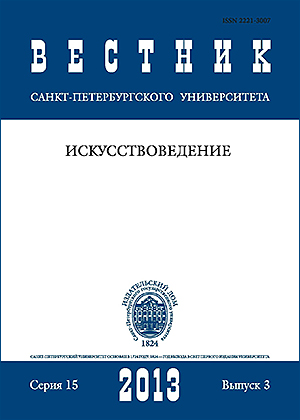Temporary intersections of new music and G. Deleuze’s philosophy: Eon, Husserl’s “consciousness horizon” and “Hours of Bergson”
Abstract
The main concern of the article is musical time. The category of time is considered through philosophy and new music. Two interpretations of time — Chronos time and Aion time, according to the French philosopher G. Deleuze, are opposite. Music can be substantially defined through the stream of time. Structuring musical time and its various concepts are considered in the context of musical ideas of the Italian composer S. Sciarrino. Among the compositions by S. Sciarrino analyzed in the article is “Vanitas”, a great paraphrase of the canzone of Stardust where the author refers to the emptiness of Aion metaphor. Contrasting Chronos and Aion as two forms of time can help to identify their properties: the former is limited and infinite, while the latter is boundless as the future and past, but finite as a present moment. As a conclusion, the article argues that S. Sharrino’s strive for musical forms which correspond to the processes of consciousness and the Theory of duration of A. Bergson is also connected with his theory of memory. Memory is characterized by such a structure that the past and the present can be regarded as not mutually exclusive, but united by the process of cognition. One part of the cycle “Opera per flauto” by S. Sciarrino’s is called “Hours of Bergson” (“L’oroligio di Bergson”), that can also proves his interest in philosophy and the problem of musical time.
Keywords:
temporary intersections, Aion, Husserl’s “consciousness horizon”, «Часы Бергсона»
Downloads
References
Downloads
Published
How to Cite
Issue
Section
License
Articles of "Vestnik of Saint Petersburg University. Arts" are open access distributed under the terms of the License Agreement with Saint Petersburg State University, which permits to the authors unrestricted distribution and self-archiving free of charge.






